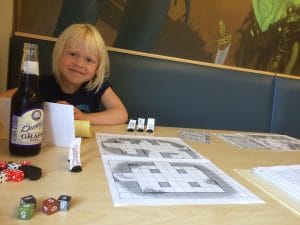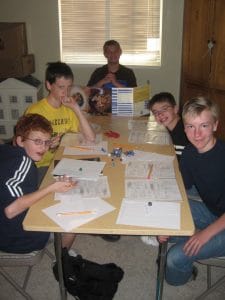I’ve been reading about education a lot (I know, what is wrong with me?!). Well, it’s kind of my job. I’m a counselor who works primarily with kids with varying challenges and disabilities. Most of the time, the reason I’m called in is to help get a child ready for school. They need to sit still. They need to pay attention. They need to learn.
But that’s not really how it works. We’re taking away art, music, even recess (!!!) so kids will have more time to focus on more important subjects. But we’re ending up with kids who are anxious, depressed, or even angry. Meanwhile in Finland, kids do a lot more playing early on, yet by 15 they’re scoring really high on international measures. It only gets worse as we get older.
Society tries to trick us into growing up, to stop playing in order to be a productive member of society. Comics, superheroes, sci-fi, fantasy, gaming, etc…all those things are for kids.
But here’s where we nerds are right: the simple fact is play is more than just fun. Play is important. Play is educational. Play is even therapeutic.
So, in typical Nerds on Earth fashion, I give you seven reason why play is important.
7 Reasons Why Nerdy Things are Therapy for the Mind, Body, and Soul
7. Engagement. We are social beings. Not just the extroverts, but everybody. We all need human contact (or else we end up painting faces on volleyballs). That’s why solitary confinement is a punishment.
Even if you’re an introvert, you need to connect with someone, to share with someone. Play provides a common ground, a reason for engagement, that brings us together. It’s something that unites us. (And we need as much of that as we can get).

6. Resilience. When we feel good, when we’re having fun, we are preparing ourselves for success. Play affects our outlook and expectations. We’re more open and optimistic. Our attitude not only makes success more likely, but it changes how we define success.
When we fail in the context of a joyful shared experience, the stakes aren’t as high and the emotional impact of that failure is reduced. We feel safer, so it’s easier to take risks and try things that might not work.
It’s a win-win: if we fail we had fun and maybe we learned something; and if we succeed, we’ve helped reinforce our positive outlook, and we’ve established some positive experiences around challenges to fall back on. So, the next time we face that challenge, we’ve done a little “emotional weight lifting” to help condition ourselves to handle stress, and had fun doing it.
5. Empathy. When we get together, we are exposed to other ideas and other points of view. We’re connected, having fun, open and primed for success. Maybe in a game we play a role we otherwise wouldn’t, or through the course of the game another player does something we wouldn’t have conceived or considered. We’ve just gained some insight into what it might be like to not be us, to be someone else. That provides an opportunity for growth. Who do we want to be? What’s important to us? How do we see ourselves? How do we feel about that?
4. Problem solving. Challenges are stressful. Handling situations that are new and/or difficult can produce anxiety, sometimes even trigger a flight, flight, or freeze response. But now, we’re connected, we’re primed for success, we are able to see and even take different perspectives. This opens up a whole new world of potential.
Plus, we now have the confidence and freedom to try lots of different things to solve the problem – new strategies, new tactics, and even new relationships.
(Can you feel the momentum building? Once we get that foundation set, the benefits of play just start piling up like a ship full of tribbles.)
 3. Communication. Play makes us better communicators. We’re more thoughtful and flexible, we’re better at reading and understanding people, and that helps us tailor our communication to other players. And if you can teach somebody the Pathfinder rules for grappling, talking your way out of the doghouse with your significant other after dropping a hundred bucks on the latest wave of X-Wing miniatures for your collection is a piece of cake.
3. Communication. Play makes us better communicators. We’re more thoughtful and flexible, we’re better at reading and understanding people, and that helps us tailor our communication to other players. And if you can teach somebody the Pathfinder rules for grappling, talking your way out of the doghouse with your significant other after dropping a hundred bucks on the latest wave of X-Wing miniatures for your collection is a piece of cake.
2. Collaboration. Now we’re armed with all the skills and confidence to tackle our own challenges and our own relationships. Knowing how your Paladin would solve a problem is one thing, getting the whole party working together to take down the BBEG is something else.
As we continue to learn and grow (and have fun) the scale of problems we’re able to handle increases. Congratulations, you’re now epic level!
1. Respite. The best part about all of this is that play helps us–mind, body, and spirit. It helps us learn, it helps us heal (yup, positive thinking can actually alter our neurochemistry and boost our immune system), and it just plain old makes us better people.
So grab your copy of Pandemic, or the Starfinder Core Rulebook…
Or, break out the Legos…
Or, dress up like your favorite hero (or villain)…
Grab some other people, and play. It’s not just fun, it makes us better people.

